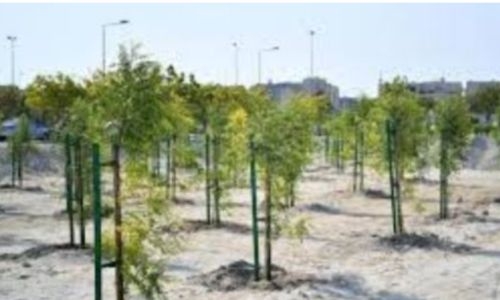Bahrain Needs Innovative Afforestation
BY KOTA SRIRAJ
The quest for “zero carbon neutrality” has gripped the nations of the world as they attempt to ward off climate change and its disastrous consequences.
Bahrain has had the foresight to plan for zero neutrality in terms of carbon emissions by the year 2060. To this effect the island nation has mobilised several initiatives to cut down carbon emissions.
But notably Bahrain has put afforestation on top priority in the efforts to dial down carbon emissions and as a part of this the establishment of nurseries has been accelerated which can nurture and plant nearly 1,10,000 mangroves in various locations.
Similarly, initiatives are also being taken to increase the urban green canopy by planting 1,40,000 trees in various streets, squares and avenues.
These ambitious efforts are a part of Bahrain’s afforestation plans according to which the green cover of the nation is expected to double by 2035.
Interestingly, these aggressive efforts by Bahrain especially with regard to mangrove expansion are four times more than the goals stipulated by United Nations Framework Convention on Climate Change (UNFCC).
All these efforts are also being complimented by Bahrain’s initiative to launch the Botanical Atlas Project (BAP). BAP launched via the National Geographic Database platform utilises satellite imagery to measure the vitality and greenness of the vegetation.
This has further strengthened Bahrain’s efforts to accelerate the afforestation efforts. As we go forward the pace of climate change is set to rapidly increase thanks to spiralling carbon emissions.
Bahrain is no exception to this dynamic scenario and in order to keep up and in fact overtake the problem the current measures as mentioned above may not be sufficient by themselves. Innovative afforestation is one initiative that can have a direct impact in neutralising carbon emissions and drive Bahrain towards zero carbon neutrality.
The Miyawaki afforestation method is one such innovative step. This method involves planting a variety of indigenous species close together, which helps the plants grow faster and stronger through mutual support and competition.
Bahrain can identify the species and locations where this initiative can be applied. Bahrain can also rope in peri-urban and rural communities into a Community Nursery project that empowers the communities to grow, plant and protect native trees in exchange for economic benefits.
This innovative step can help Bahrain restore and safeguard existing forests and build new forest sectors.
In order to speed up afforestation process Bahrain can also utilise technology and create an open mobile tree tracking app that can connect tree growers to tree funders.
This unique innovation can speed up afforestation even in the remote parts of Bahrain by bringing tree enthusiasts together who empower the local people to grow trees by funding them. Bahrain can also utilise advanced scientific methods that focus on tree genetics to ensure healthy seedlings.
This combined with effective site selection can establish a firm foundation for the afforestation efforts as the tree’s planted through this method will be more resilient and capable of surviving the harsh climate of Bahrain. Afforestation is the only method that can stop carbon build up as forests have the amazing capability to store carbon by removing them from atmosphere.
This combined by a shift to cleaner emission free fuels can make Bahrain’s quest for Zero Carbon Neutrality much more easier.
Israel’s retaliatory military offensive in Gaza has killed at least 39,790 people, according to the territory’s health ministry KNOW BETTER
(The views and opinions expressed in this article are those of the author and do not necessarily reflect the official policy or position of the Daily Tribune)
KOTA SRIRA
Related Posts


